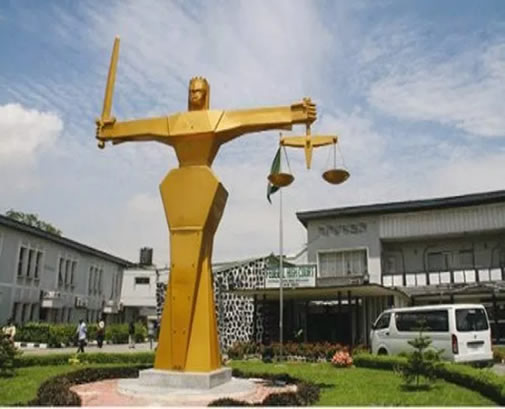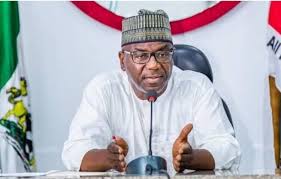Economy
FAAC Shares N903.480 bn September revenue to FG, States, LGs

The Federation Account Allocation Committee (FAAC) has shared a total of N903.480 billion September 2023 Federation Account Revenue to the Federal Government, states and Local Government Councils (LGCs).
This is contained in a communique issued by the FAAC at the end of its October meeting held in Abuja on Tuesday.
The communique indicated that the N903.
480 billion total distributable revenue comprised distributable statutory revenue of N423. 012 billion, Value Added Tax (VAT) revenue of N282.666 billion, Electronic Money Transfer Levy (EMTL) revenue of N10.989 billion and Exchange Difference revenue of N 186.813 billion.It stated that a total revenue of N1594.
763 billion was available in the month of September 2023.“Total deductions for cost of collection was N54.426 billion, total transfers and refunds was N347.857 billion and savings was N289.000 billion,” the committee stated.
It said that gross statutory revenue of N1014.953 billion was received for September, which was higher than the N891.934 billion received in August by N123.019 billion.
It added that the gross revenue available from VAT was N303.550 billion, which was lower than the N345.727 billion available in August by N42.177 billion.
“From the N903.480 billion total distributable revenue, the Federal Government received a total of N320.543 billion, the state governments received N287.071 billion and the LGCs received N210.900 billion.
“A total sum of N84.966 billion (13 per cent of mineral revenue) was shared to the relevant states as derivation revenue.
“From the N423.012 billion distributable statutory revenue, the Federal Government received N190.849 billion, the state governments N96.801 billion and LGCs received N74.629 billion.
“The sum of N60.733 billion (13 per cent of mineral revenue) was shared to the relevant states as derivation revenue,’” it said.
It said that the Federal Government received N42.400 billion, the state governments received N141.333 billion and the LGCs received N98.933 billion from the N282.666 billion VAT revenue.
The communique further said that N10.989 billion EMTL was shared as follows:
The Federal Government received N1.648 billion, the state governments received N5.495 billion and the Local Government Councils received N3.846 billion.
“The Federal Government received N85.647 billion from the N186.813 billion Exchange Difference revenue, the state governments received N43.442 billion, and the LGCs received N33.491 billion.
“The sum of N24.233 billion (13 per cent of mineral revenue) went to the relevant states as derivation revenue.
“The balance in the Excess Crude Account (ECA) was 473,754.57 dollars,” it said.
The News Agency of Nigeria (NAN) reports that in September, Petroleum Profit Tax (PPT) and Oil and Gas Royalties increased considerably while VAT, Import and Excise Duties, EMTL, Companies Income Tax (CIT) and CET Levies recorded significant decreases. (NAN)
Economy
Eid-el-Kabir: Ram Sellers Decry Low Patronage as Prices Soar in Ile-Ife

The Chairman, Ram Sellers’ Association, Odo-Ogbe Market, Ile-Ife, Osun, Alhaji Akeem Salahudeen, has complained of low patronage, attributing it to high cost of rams and the economy situation in the country.
Salahudeen stated this in an interview on Wednesday in Ile-Ife.
He said that the big sized ram which was sold between N550,000 and N620,000 last year are now being sold at the rate of N800,000 to N1.
2 million.He added that the medium sized ram which was sold between N300,000 and N350,000 last year is now going for between N450,000 and N550,000.
According to him, small sized ram sold for N200,000 and N230,000 last year now attracts N300,000 and N450,000 this year.
He attributed the increase in the prices of rams in this year’s Sallah to the insecurity in the North, which he claimed had disrupted the supply chain.
“They said the worsening insecurity in the North has forced some sellers to import rams from neighbouring countries like Niger, Mali and Chad, which they said contributed to the high prices,” he emphasised.
At Sabo Cattle Market in Ile-Ife, Alhaji Saheed Yaro, said that the price of rams has surged as the small sized ram which was sold at N150,000 and N180,000 last year, is now being sold between N250,000 and N350,000.
Yaro added that the price of medium sized ram which was between N185,000 and N260,000 last year now goes for between N350,000 to N450,000.
Accordingly, the big sized ram sold between N480,000 and N500,000 last year is now between N550,000 and N780,000.
At Boosa Cattle Market located at Modakeke, Mr Musa Salami stated that prices of rams have witnessed sharp increase with a medium sized ram which was for N170,000 to N200,000 last year is now at N250,000 to N300,000.
Salami stated further that the big sized ram that was sold at N350,000 and N400,000 is now being sold at N600,000 to N750,000.
He added that he brought 150 rams a week ago, but has been able to sell only 15, explaining that many customers turned back on hearing prices without buying.
He noted that customers who usually bought rams from him over the years are now complaining about costs.
NAN reports that ram sellers expressed concern over low patronage in many markets, saying that customers were lamenting the high cost of the animals.
A civil servant, Mr Bayo Olabisi, said that most workers in the state cannot afford to buy rams for this year’s Eid-el-Kabir due to the high prices and the economic hardship.
Olabisi added that the present economic hardship has been taken a toll on the workers, especially with the high transportation and other costs following the removal of fuel subsidy by the government.
“In fact, I visited three places where they sell rams, but I couldn’t buy any because I can’t afford to buy.
“When I priced a medium sized ram, the seller told me N250,000, the same size of ram I bought for N150,000 last year.
“I would rather use part of my salary to buy half bag of rice and two chickens for my family.
“For Allah has said that if you can’t afford ram, you should not borrow or buy on credit because there’s no reward on that,“ he said. (NAN)
Economy
We’ll Continue Borrowing Within Sustainable Limits- FG

The Federal Government says it will continue to borrow within manageable and sustainable limits in accordance with the Debt Management Office (DMO) debt sustainability framework.
This is contained in a statement by the Director, Information and Public Relations in the Ministry of Finance, Mr Mohammed Manga, in Abuja on Wednesday.
President Bola Tinubu recently requested the approval of the 2024 – 2026 external borrowing rolling plan from the National Assembly.
Tinubu has requested the National Assembly’s approval to secure external loans of 21.5 million dollars and 15 billion Yuan, along with a grant of 65 million Euro, as part of the federal government’s proposed 2025–2026 external borrowing plan.
Manga said that the proposed borrowing plan was an essential component of the Medium-Term Expenditure Framework (MTEF) in accordance with both the Fiscal Responsibility Act 2007 and the DMO Act 2003.
“The plan outlines the external borrowing framework for both the federal and sub-national governments over a three-year period, accompanied by five detailed appendices on the projects, terms and conditions, implementation period, etc.
“By adopting a structured, forward-looking approach, the plan facilitates comprehensive financial planning and avoids the inefficiencies of ad-hoc or reactive borrowing practices.
“This strategic method enhances the country’s ability to implement effective fiscal policies and mobilise development resources,” he said.
According to the statement, the borrowing plan does not equate to actual borrowing for the period.
“The actual borrowing for each year is contained in the annual budget. In 2025, the external borrowing component is 1.23 billion dollars, and it has not yet been drawn.
“This is planned for H2 2025, the plan is for both federal and several state governments across numerous geopolitical zones including Abia, Bauchi, Borno, Gombe, Kaduna, Lagos, Niger, Oyo, Sokoto, and Yobe States.
“Importantly, it should be noted that the borrowing rolling plan does not equate to an automatic increase in the nation’s debt burden.
“The nature of the rolling plan means that borrowings are split over the period of the projects, for example, a large proportion of projects in the 2024–2026 rolling plan have multi-year drawdowns of between five to seven years which are project-tied loans,” Manga said.
He said that these projects cut across critical sectors of the economy, including power grids and transmission lines, irrigation for improving food security, fibre optics network across the country, fighter jets for security, rail and road infrastructure.
According to him, the majority of the proposed borrowing will be sourced from the country’s development partners, like the World Bank, African Development Bank, French Development Agency, European Investment Bank, JICA, China EximBank, and the Islamic Development Bank.
Manga said that these institutions offer concessional financing with favourable terms and long repayment periods, thereby supporting Nigeria’s development objectives sustainably.
He said that the government seeks to reiterate that the debt service to revenue ratio has started decreasing from its peak of over 90 per cent in 2023.
Manga said that the government has ended the distortionary and inflationary ways and means.
According to him, there is significant revenue expectations from the Nigerian National Petroleum Corporation Limited (NNPC Ltd), technology-enabled monitoring and collection of surpluses from government owned enterprises and revenue-generating ministries, departments, and agencies and legacy outstanding dues.
“Having achieved a fair degree of macroeconomic stabilisation, the overarching goal of the federal government is to pivot the economy onto a path of rapid, sustained, and inclusive economic growth.
“Achieving this vision requires substantial investment in critical sectors such as transportation, energy, infrastructure, and agriculture.
“These investments will lay the groundwork for long-term economic diversification and encourage private sector participation.
“Our debt strategy is therefore guided not solely by the size of our obligations, but by the utility, sustainability, and economic returns of the borrowing,” he said.(NAN)
The Federal Government says it will continue to borrow within manageable and sustainable limits in accordance with the Debt Management Office (DMO) debt sustainability framework.
This is contained in a statement by the Director, Information and Public Relations in the Ministry of Finance, Mr Mohammed Manga, in Abuja on Wednesday.
President Bola Tinubu recently requested the approval of the 2024 – 2026 external borrowing rolling plan from the National Assembly.
Tinubu has requested the National Assembly’s approval to secure external loans of 21.5 million dollars and 15 billion Yuan, along with a grant of 65 million Euro, as part of the federal government’s proposed 2025–2026 external borrowing plan.
Manga said that the proposed borrowing plan was an essential component of the Medium-Term Expenditure Framework (MTEF) in accordance with both the Fiscal Responsibility Act 2007 and the DMO Act 2003.
“The plan outlines the external borrowing framework for both the federal and sub-national governments over a three-year period, accompanied by five detailed appendices on the projects, terms and conditions, implementation period, etc.
“By adopting a structured, forward-looking approach, the plan facilitates comprehensive financial planning and avoids the inefficiencies of ad-hoc or reactive borrowing practices.
“This strategic method enhances the country’s ability to implement effective fiscal policies and mobilise development resources,” he said.
According to the statement, the borrowing plan does not equate to actual borrowing for the period.
“The actual borrowing for each year is contained in the annual budget. In 2025, the external borrowing component is 1.23 billion dollars, and it has not yet been drawn.
“This is planned for H2 2025, the plan is for both federal and several state governments across numerous geopolitical zones including Abia, Bauchi, Borno, Gombe, Kaduna, Lagos, Niger, Oyo, Sokoto, and Yobe States.
“Importantly, it should be noted that the borrowing rolling plan does not equate to an automatic increase in the nation’s debt burden.
“The nature of the rolling plan means that borrowings are split over the period of the projects, for example, a large proportion of projects in the 2024–2026 rolling plan have multi-year drawdowns of between five to seven years which are project-tied loans,” Manga said.
He said that these projects cut across critical sectors of the economy, including power grids and transmission lines, irrigation for improving food security, fibre optics network across the country, fighter jets for security, rail and road infrastructure.
According to him, the majority of the proposed borrowing will be sourced from the country’s development partners, like the World Bank, African Development Bank, French Development Agency, European Investment Bank, JICA, China EximBank, and the Islamic Development Bank.
Manga said that these institutions offer concessional financing with favourable terms and long repayment periods, thereby supporting Nigeria’s development objectives sustainably.
He said that the government seeks to reiterate that the debt service to revenue ratio has started decreasing from its peak of over 90 per cent in 2023.
Manga said that the government has ended the distortionary and inflationary ways and means.
According to him, there is significant revenue expectations from the Nigerian National Petroleum Corporation Limited (NNPC Ltd), technology-enabled monitoring and collection of surpluses from government owned enterprises and revenue-generating ministries, departments, and agencies and legacy outstanding dues.
“Having achieved a fair degree of macroeconomic stabilisation, the overarching goal of the federal government is to pivot the economy onto a path of rapid, sustained, and inclusive economic growth.
“Achieving this vision requires substantial investment in critical sectors such as transportation, energy, infrastructure, and agriculture.
“These investments will lay the groundwork for long-term economic diversification and encourage private sector participation.
“Our debt strategy is therefore guided not solely by the size of our obligations, but by the utility, sustainability, and economic returns of the borrowing,” he said.(NAN)
Economy
Organise Informal Sector, Tax Prosperity Not Poverty, Adedeji Tasks Officials

The Chairman, Joint Tax Board (JTB), Dr Zacch Adedeji, has urged officials of the board to organise traders and artisans into a formal body before capturing them in the tax net.
Adedeji said that this was in line with the agenda of President Bola Tinubu not to tax poverty but prosperity.
The chairman stated this at the 157th Joint Tax Board meeting held in Ibadan, on Monday.
The theme of the meeting “Taxation of the Informal Sector: Potentials and Challenges”.
Speaking on the theme of the event, Adedeji stressed the need to evolve a system that would make the informal sector formal before it could be taxed.
Adedeji, who also doubles as the Chairman, Federal Inland Revenue Service, (FIRS), said “What I would not expect from the JTB meeting is to define a system that would tax the informal sector.
“The only thing is to formalize the informal sector, not to design a system on how to collect tax from market men and women.
“As revenue administrator, our goal is to organise the informal sector so that it can fit into existing tax law.”
Citing a report of the National Bureau of Statistics (NBS) in the first quarter of 2023, the chairman said that the nation’s unemployment index was attributable to recognised informal work.
Adedeji stated that workers in that sector accounted for 92.6 per cent of the employed population in the country as at Q1 2023.
“JTB IS transiting to the Joint Revenue Board with expanded scope and functions.
“We are hopeful that by the time we hold the next meeting of the Board, the Joint Revenue Board (Establishment) Bill would have been signed into Law by the President.
“The meetings of the board provide the platform for members to engage and brainstorm on contemporary and emerging issues on tax, and taxation,” he said.
In his address, Gov. Seyi Makinde of Oyo State, said the theme of the meeting was apt and timely, stressing that it coincides with the agenda of the state to improve on its internally generated revenue.
According to him, the meeting should find the best way forward in addressing the issue of the informal sector and balance the identified challenges.
“Nigeria is rich in natural resources, but it is a poor country because economic prosperity does not base on natural resources,”
Makinde also said that knowledge, skill and intensive production were required for economic prosperity, not just the availability of natural resources.
He stressed the need to move from expecting Federal Allocations to generating income internally.
“We are actively ensuring that people are productive and moving the revenue base forward,” Makinde said.
The governor said that tax drive should be done by simplifying tax processes, incentives for compliance like access to empowerment schemes and loans.
He urged JTB to deepen partnership and innovation in using data on tax to track and administer it.
Earlier, the Executive Chairman, Oyo State Board of Internal Revenue, Mr Olufemi Awakan, said the meeting was to address tax-related matters, evolve a workable, effective and
efficient tax system across the states and at the Federal level.
He urged participants to find amicable solutions to challenges of tax jurisdiction, among others.
Tax administrators from all the 36 states of the federation, who are members of JTB, were in attendance. (NAN)




















